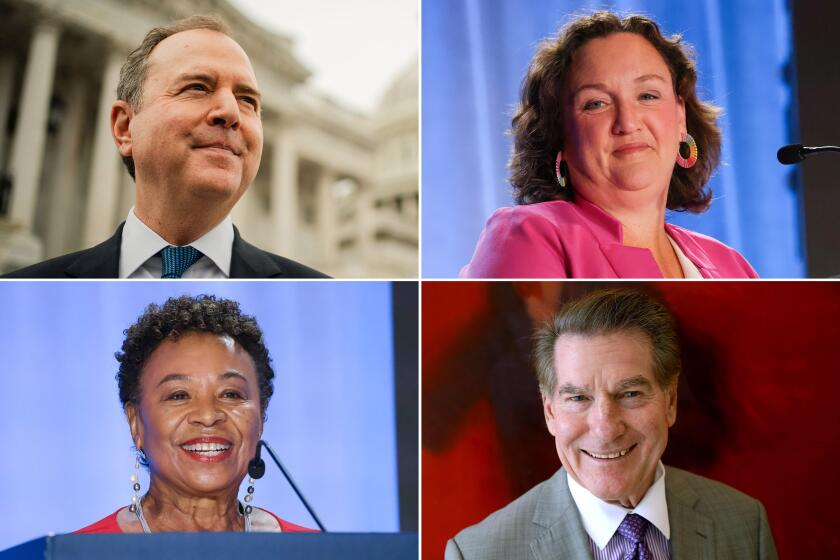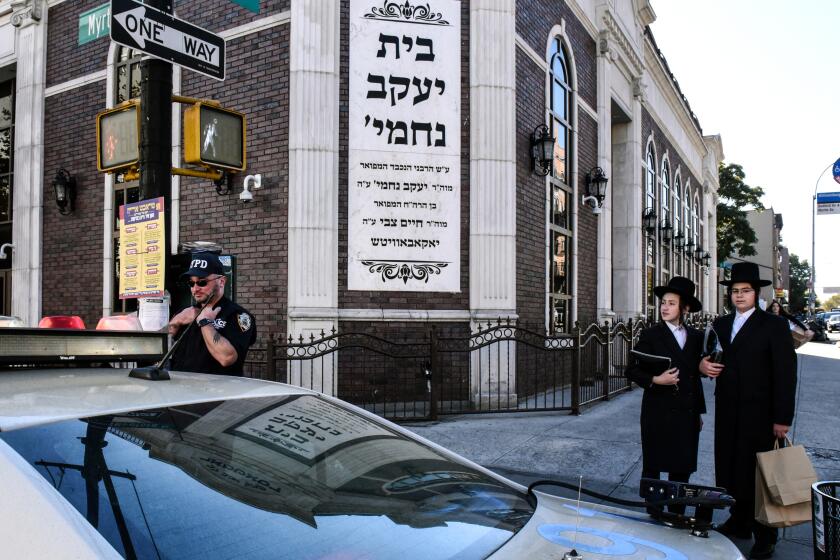L.A. Times poll: Younger, older Californians take starkly different views of Israel-Hamas war

- Share via
Three months of war between Israel and Hamas have sharply split Californians, with stark divisions between the state’s older and younger voters, a new statewide poll finds.
Voters younger than 30 are far more likely to sympathize with Palestinians more than with Israelis, while those older than 65 side with Israel, according to the new poll by UC Berkeley’s Institute of Governmental Studies, co-sponsored by the Los Angeles Times.
By 55%-18%, voters younger than 30 say Israel should agree to a cease-fire even if that would mean Hamas remains a force in Gaza.
Among voters older than 65, opinion is almost the reverse: By 52%-32%, those voters believe Israel should keep fighting until Hamas is no longer viable. Twenty-seven percent of the youngest voters and 16% of those over 65 had no opinion, the poll found.
Rep. Katie Porter and former Dodgers star Steve Garvey are in a tight contest to see who will join Rep. Adam Schiff in the general election for a U.S. Senate seat.
The survey finds similarly sharp divisions along ideological lines, with the state’s most liberal voters overwhelmingly saying Israel is using too much military force in the war, while conservative voters say that the use of force has been about right or too little.
Jen Julian, a 26-year-old progressive voter who lives in Los Angeles, is among those who feel the war has been too costly. The death toll among Palestinians — which health authorities in Gaza say is more than 23,000 — was “too much of a human cost,” she said in an interview.
Israel launched its air strikes and a ground invasion of Gaza after Hamas militants attacked Israel on Oct. 7, killing at least 1,200 people and taking more than 240 hostages.
“I understand Israel was attacked and felt it needed to respond to that, but this is way too much for way too long,” she said.
You are reading our Politics newsletter
The latest news, analysis and insights from our politics team.
You may occasionally receive promotional content from the Los Angeles Times.
Joey Johnson, a 68-year-old conservative from Redding, took a different view.
“This is like Israel’s 9/11,” Johnson said. “If America was attacked the way Israel was by terrorists, we also would want to do everything we could to stop it from ever happening again. But of course it is tragic that innocent people are dying in Gaza.”
Two-state solution still dominant
While views are divided sharply about the current war, the poll shows greater agreement among California voters on the future of the conflict.
Separate, independent Israeli and Palestinian states dividing the land remains the most favored option for all but the most conservative voters.
That so-called two-state solution has been official U.S. policy for decades and at various points in the past, at least nominally accepted as a goal by the Israeli government and the Palestinian Authority, which has limited governing power in the West Bank.
An independent Palestinian state is opposed, however, by right-wing Israelis, who have strong sway in the current government, headed by Prime Minister Benjamin Netanyahu. Meantime, Hamas and other radical Palestinian groups reject Israel’s continued existence.
Among California voters, the two-state solution is backed by a large majority of those who have an opinion — 47% prefer two states, while 25% have no opinion and the rest divide among other options.
Two states is what Rabbi Jonathan Klein hopes for.
As the leader of Temple Beth El in Bakersfield and a self-described “lifelong liberal Zionist,” Klein, 55, said he has kept a close watch on news out of Israel and Gaza.
“My community is pretty universally supportive of Israel’s efforts to combat what they see as an existential threat,” Klein said.
“But I recognize that just because Jews have a historic tie to the area doesn’t mean that other people don’t. Do I think co-existence is possible? I hope it is, but I do not know at this point.”
The poll finds significantly less support for an option espoused by some on the left — a unified bi-national state. One in eight voters said they would like to see a single state that would be neither Jewish nor Palestinian. Support for that comes mainly from the left, with just under 1 in 5 of the state’s liberals backing it.
The word has become shorthand for systems of oppressive rule around the world — and a popular refrain of pro-Palestinian activists.
There’s very little support for Hamas’ goal of an Arab state that would control all the territory between the Jordan River and the Mediterranean Sea. While that idea has been backed by demonstrators at some recent protests, just 3% of the state’s voters support it. Support rises to 7% among those under 30 and 8% of those who identify as strongly liberal.
“Israel is an illegitimate state,” said Reza Nekumanesh, a 47-year-old Iranian American who lives in Fresno. “I don’t believe that means any particular group of people does not have the right to live and exist there in peace and equity and justice,” Nekumanesh said. “But I don’t believe any state should be founded and centered upon an ethnic or religious identity.”
At the other end of the ideological spectrum, 11% of the state’s voters back a single Israeli state controlling all the territory — the goal of the Israeli right.
Netanyahu and his allies have strong backing within Republican ranks, however, and support for Israeli control over the entire region rises to 31% among the state’s Republican voters and 43% of those who identify as strongly conservative.
Divided Sympathies
The poll finds 30% of California voters saying they sympathize more with Israelis than Palestinians in the current conflict and a similar share, 28%, sympathizing with both sides equally.
Mordecai Miller, a 74-year-old resident of Redwood City, said he felt pain for both sides, but felt closer to the plight of Israelis after Oct. 7.
“None of this war would have happened if Hamas had not intentionally attacked Israel and desired to eradicate it,” said Miller. “Israel has been forced to retaliate.”
A slightly smaller share, 24%, say they sympathize more with the Palestinians.
That includes Rami Sultan, a Palestinian American in Santa Clara who has family in Gaza.
The 41-year-old tech worker said he was incensed by what he described as “genocide.”
“This isn’t a war on Hamas at all. This is a clear war against the Palestinian people,” said Sultan.
Sympathies vary dramatically by age and ideology.
Among voters younger than 30, for example, 44% say they sympathize more with the Palestinians, while just 14% say they sympathize more with the Israelis and 21% with both equally.
Among those 65 and older, 46% sympathize more with the Israelis, 13% with the Palestinians and 32% with both equally.
Biden caught in middle
Divided opinion over the war has left President Biden vulnerable to criticism from both left and right.
Overall, 55% of the state’s voters disapprove of Biden’s response, while 33% approve.
But 64% of voters who describe themselves as strongly liberal disapprove of Biden’s response to the conflict, as do 67% of those who identify as strongly conservative.
The sharp division by age is a major factor, with 69% of voters younger than 30 and 65% of those 30-39 disapproving of how Biden has handled the conflict.
Melissa Brown, a 40-year-old conservative voter in San Diego, said Biden “was very strong on Israel at first, as he should have been.”
“He still is strong, but you can see him caving to the pressure from the left, sending messages that Israel needs to tone down its self-defense,” she said. “I disagree.”
Concern over antisemitism, Islamophobia
Despite their differences over the war and the underlying Israeli-Palestinian conflict, large majorities of California voters across party lines share a concern about a rise in anti-Jewish or anti-Arab violence or hate incidents.
Asked about antisemitic incidents, 80% of California voters say they’re concerned about them, 12% were not concerned. Similarly, 75% said they were concerned about anti-Arab or anti-Muslim incidents, compared with 17% who were not concerned.
Even before the Gaza war, antisemitism was on the rise. That has deeply unsettled many American Jews, accustomed to seeing the U.S. as a safe haven.
The poll found very little division along ideological or party lines in concern about antisemitism, but a noticeable partisan difference over anti-Muslim incidents.
Among Democrats, the share who expressed concern about antisemitism and anti-Muslim hate were about equal. Among Republicans, 81% said they were concerned about antisemitism, while 13% were not. But 60% were concerned about anti-Muslim hate, compared to 31% who were not.
The Berkeley IGS poll surveyed 8,199 California registered voters. It was conducted online in English and Spanish on Jan. 4-8.
The results were weighted to match census and voter registration benchmarks, so estimates of the margin of error may be imprecise; however, the results have an estimated margin of error of 1.5 percentage points in either direction.
More to Read
Get the L.A. Times Politics newsletter
Deeply reported insights into legislation, politics and policy from Sacramento, Washington and beyond. In your inbox three times per week.
You may occasionally receive promotional content from the Los Angeles Times.















